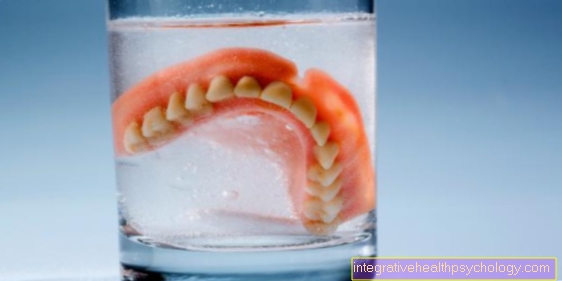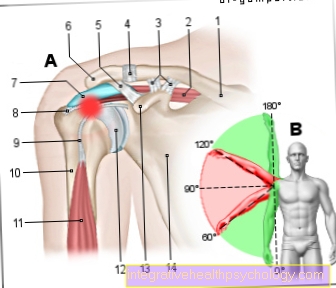Causes of Crohn's Disease
General causes
The diagnosis of Crohn's disease is a stroke of fate for many people.
Naturally, many of those affected then ask themselves whether they could have done something in advance to prevent the disease from developing. However, relatively little is known about the reasons for the development of Crohn's disease - despite intensive research efforts, the cause has not yet been fully clarified. However, there are several theories, all of which probably contribute to the development of the disease. Together they cause the body's own defense against bacteria in the intestine to fail, which causes inflammation as a reaction of the body to the seemingly overpowering germs.

Therefore, Crohn's disease is classified as an autoimmune disease. One of the most important reasons for this failure of the immune system is arguably a genetic predisposition. In twin studies, the heritable share of the disease could be set at 60 - 70%, first-degree relatives of an affected person have a disease risk of around 10%.
Several hereditary factors have been discovered in the human genome that contribute to the development of the disease, for example by producing fewer "endogenous antibiotics" due to changes in the genetic make-up, which normally protect the mucous membranes of the large intestine from bacteria. Together with many other, as yet unidentified, factors this leads to the natural barrier between intestinal wall and intestinal contents being disturbed, which is why actually harmless bacteria of the normal intestinal flora attack the intestinal wall and thus trigger inflammation.
There is also evidence that the bacterium “Mycobacterium avium subspecies paratuberculosis” can trigger Crohn's disease if the host has a certain gene mutation. The role of this pathogen is unclear, but studies have found antibodies against it in more than 60% of all Crohn's disease patients.
Too much hygiene can also play a role in the development of the disease. That would explain the preferential occurrence of Crohn's disease in countries with high hygienic standards. Studies have also shown that smoking doubles the likelihood of developing Crohn's disease. Mental and nutritional causes have long been controversial.
Mental causes
The thesis that the chronic inflammatory bowel diseases Crohn's disease and ulcerative colitis are also triggered by psychological causes is widespread.
For a long time it was assumed that stress and internal conflicts contribute significantly to the development of illness. In 1950 the two diseases were even included in the catalog of classical psychosomatic diseases (i.e. diseases that are triggered purely by the psyche and for which there is no organic trigger).
But today we know that these assumptions are wrong. The psyche does not contribute to the development of Crohn's disease. It is quite different with the course of the disease, which is clearly influenced by psychological factors.
Affected people whose mental health is poor, for example because they suffer from depression, have to struggle with flare-ups more often than those who are mentally healthy.
Diet-related causes
At first glance, it seems obvious that inflammation of the digestive tract has something to do with the eating habits of the person concerned.
In fact, the accumulation of Crohn's disease in industrialized countries suggests that the development of the disease is influenced by lifestyle and thus diet.
Studies have found that inflammatory bowel disease is more common in people whose diet is high in protein from animals (other than fish) and from milk. The same applies to polyunsaturated omega-3 and omega-6 fatty acids.
In contrast, the consumption of vegetable proteins is associated with a lower risk of Crohn's disease and ulcerative colitis. Nevertheless, the importance of nutrition for the development of the disease is now viewed as rather secondary. Other causes, such as genes and certain pathogens, seem to have more influence.
You may also be interested in this topic: Diet in Crohn's disease
Genetic causes
The development of Crohn's disease is likely to be influenced to a relatively large extent by the patient's genetic makeup. This also explains the fact that first-degree relatives of those affected have an approximately 30-fold increased risk of developing Crohn's disease compared to the rest of the normal population.
In fact, over 30 different genes have been discovered to date, the mutation of which is associated with the development of the disease. The actual functions of these genes for healthy people are not yet fully understood. The significance of the mutations among each other is also still unclear. It is noticeable that many of these mutations not only increase the likelihood of chronic inflammatory bowel disease, but also increase the susceptibility to infections caused by mycobacteria. This in turn supports the thesis that the bacterium "Mycobacterium avium subspecies paratuberculosis" could also contribute to the development of the disease.
It is only certain that Crohn's disease is not a classic hereditary disease, but a disease of multifactorial origin. This means that the process of the development of the disease takes place through the interaction of genes and factors from the environment (e.g. mycobacteria).
The role of stress in Crohn's disease
Many patients with inflammatory bowel disease experience great stress.
This is often largely triggered by the disease itself. The fear of the next flare-up or social isolation is all too familiar to most patients. This also explains why those affected suffer from depression more often than healthy people. Since stress itself can trigger flare-ups and worsen the prognosis of the disease, a vicious circle develops. It is therefore particularly important for people with Crohn's disease to avoid stress. Sports, relaxation techniques or professional help from psychotherapists have proven to be very helpful for many patients.
More about Crohn's disease
You can find more information from this area here:
- Crohn's disease
- The typical symptoms of Crohn's disease
- This is how Crohn's disease is treated
- Proper nutrition for Crohn's disease
- Is Crohn's disease curable?
- What is life expectancy in Crohn's disease
- Chron disease - relapse
- Chron disease and alcohol consumption, is that possible?





























